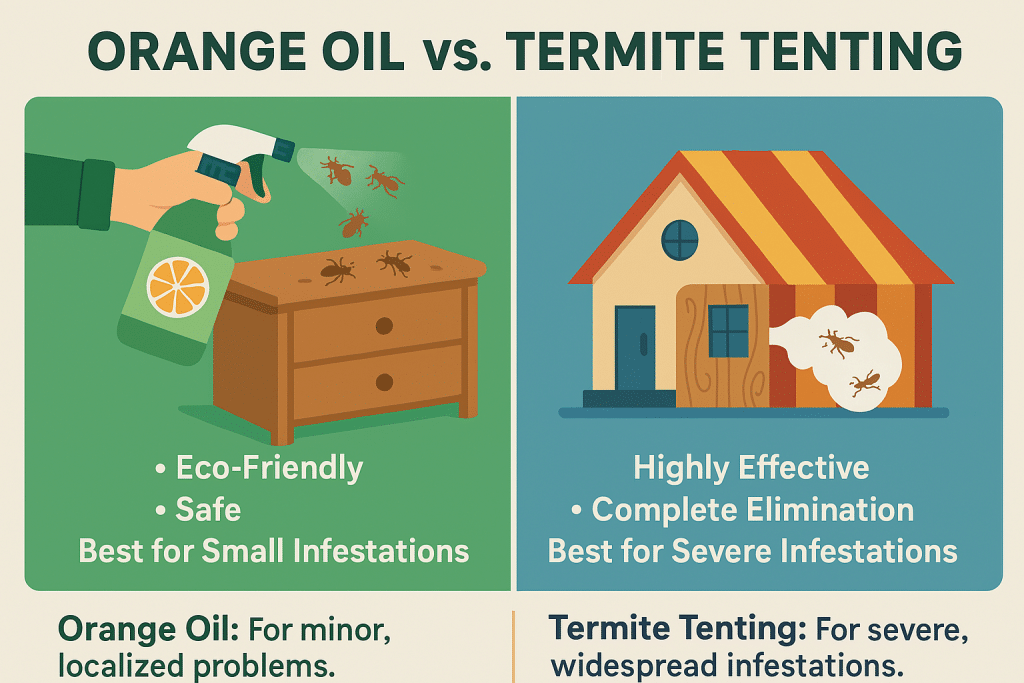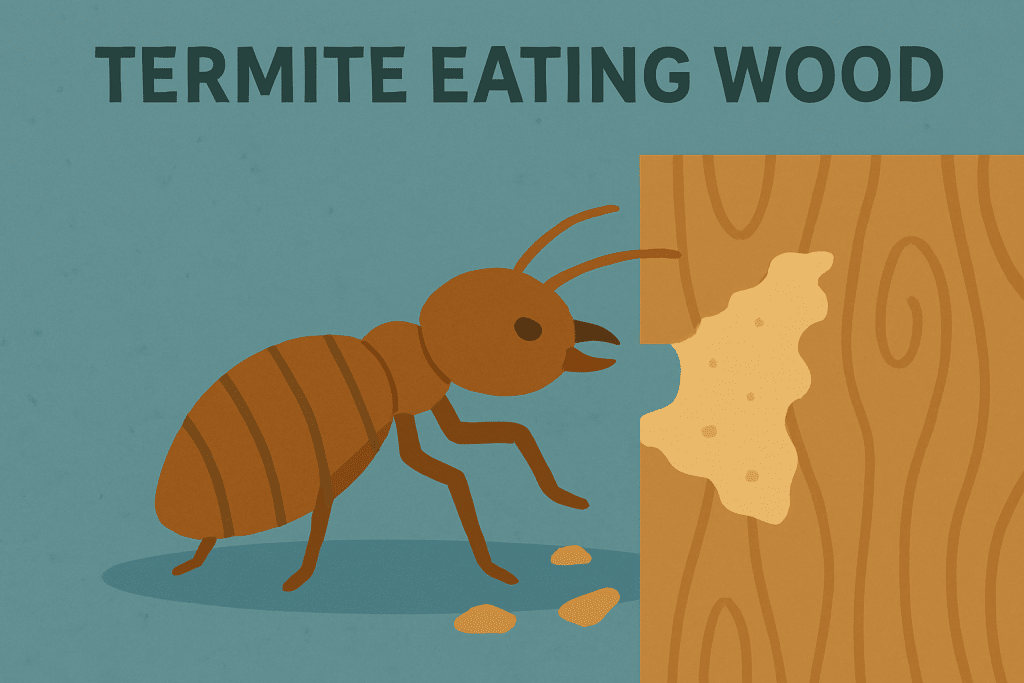
Orange Oil vs. Termite Tenting: Which works best?
Termites can completely destroy your home, often without warning. They are residing in the walls, floorings, and wood beams. You may spot them when it’s already too late, and they had already done structural damage which would take time and financial expenses to repair. These minute insects feed on cellulose in wood, which alone can weaken your property from the inside out. The earlier you catch them, the better positioned you will be to avoid the worst.
Two of the major treatments that come to mind are orange oil termite treatment and tenting, otherwise known as fumigation. Each of these methods has certain strong suits and each also carries with it some potential downsides. You may be wondering which option will suit your particular situation best. Let’s dive deeper into both so you can make a clear decision.
Orange Oil Termite Treatment
Orange oil termite treatment is based on d-limonene. It is a chemical extracted from citrus fruit peels. It is also a favourite of the environmentalists. Many like it because it is derived from plants and gentler on the surrounding than heavier chemicals. The process calls for the injection of orange oil into targeted areas. These should be areas that have active feeding or nesting by termites.
Why Many Homeowners Like It?
One big appeal with this is its Eco-friendliness. You’re not using harsh chemicals with the potential to linger for days. The oil has a pleasant, citrus smell instead of being a toxic odour. Homeowners often like that usually, they do not need to leave the house when using orange oil. Much fumigation requires a total evacuation. That means one has to pack up and secure one’s food to stay elsewhere. Orange oil does not place such stress on you to upend your life.
Smaller or contained infestations also work well for orange oil. The oil permeates the tunnels where the termites live. The d-limonene can kill them upon contact. This type of localized approach can offer quicker relief if your termite problem is not widespread.
Limitations of Orange Oil
Success in using orange oil relies on precision detection. The treatment hits specific spots, which calls for the technician to correctly trace locations housing the termites. Should failure hit in identifying the whereabouts of the hidden termite colonies, then the problem will persist. Termites can spread into corners and beams, too, which one cannot see. In those cases, treatments have to be done time and again.
This can be a repeated process that adds up in cost. Orange oil also might not penetrate deep into large colonies. If your infestations are severe, you risk incomplete coverage. That could leave enough termites to rebuild their colonies. If your house is infested to that extent, more aggressive methods might be best.
Tenting (Fumigation)
Tenting involves draping a large tarp over your whole house. Professionals then pump in a fumigant. This gas works its way deep into cracks, crevices, and hidden places, killing termites throughout the structure. Many experts recommend fumigation for heavy or long-standing infestations. It’s especially useful for drywood termites that can hide in hard-to-reach places.
Why Professionals Recommend Tenting
The most obvious advantage is complete treatment. Since gas permeates everywhere, the chances that you might miss the concealed colonies are less. On the other hand, orange oil only targets the previously-located activity sites. In tenting, the fumigant leaves no place to hide for the termites. In big infection cases, often it turns out to be better with tenting.
Tenting also tends to be faster for comprehensive results. Once you seal the home, the fumigation process gets to work. Once it is over, you can feel far more confident that the big colonies have been dealt with. This peace of mind is crucial when one is concerned about ongoing damage.
Disadvantages of Tenting
Even effective, tenting is a bother. You must be very prepared. You will have to leave your home for some days. You will need somewhere to stay while this is happening. You will also need to bag up or seal off food. Some of your belongings may need special considerations. You will also want to take some post-treatment precautions.
Another concern is the possible health and environmental impact. It involves strong chemicals and is more invasive. Many worry about exposure, though professionals must take safety precautions. Tenting is typically safe when done correctly by professionals. However, those looking for a “greener” option may be super concerned. Finally, there is often a higher upfront expense. You pay for that certainty and completeness. To many large numbers of homeowners, however, it’s well worth paying for it.
Which Method Is Right for You?
Concentrate first on the extent of your infestation. Are your damages isolated to just one area or small areas? If this is so, orange oil may be adequate. You will have less inconvenience and have less concern about chemical exposure. You can remain in your home and simply continue as usual.
If termites appear in many parts of your house, tenting offers better overall coverage. The large or long-standing often require the thorough approach of fumigation. You may be looking at higher costs, but you will deal with the problem more completely. You can get several opinions if you are unsure from professionals. Some companies offer free inspections or detailed quotes.
Personal comfort matters too. Some homeowners worry about chemicals from fumigation. They prefer an Eco-friendly route, even if it means multiple treatments. Others just want the problem solved in one sweep. They might find tenting more reassuring. Think about health factors, family members, and pets when deciding.
Practical Tips for Both Methods
Whichever route you choose, there are a few things that can help ensure your success. Let’s discuss a couple of best practices:
Have it Properly Inspected
A trained inspector knows how to find less obvious signs of termites. They search for mud tubes, droppings or hollowed-out wood. They may use a moisture meter or some other kind of specialized tool. With a thorough inspection, the true extent of your termite infestation is discovered. Then, you’ll know if orange oil or tenting is better.
Plan for Downtime If You Tent
If you opt for tenting, then you will have to be prepared to temporarily relocate. This may include staying with a relative or friend or even a hotel. Take the package food into special bags or take it out completely. There are occasions when your fumigating company could have strict instructions. Heed them, so you safely return when the treatment is over.
Follow Up
Follow-up inspections should also be scheduled even after successful treatment. Termites may return whenever conditions remain ideal to re-infest. This periodic check will help in early detection of new colonies.
Conclusion
Both orange oil and tenting termite treatment have their respective advantages. In deciding upon them, the seriousness of the infestation, your budget, and chemical comfort level come into consideration. Orange oil, however, is greener and less intrusive. For smaller or limited problems, it is quite effective. Technicians will be able to treat hot-spots with limited fuss.
If you are facing a wider threat, then tenting may be more suitable. It covers even the hidden nooks and corners. You do need to vacate the property, but the effectiveness can offer peace of mind. It usually costs more upfront, yet it may reduce the need for repeated treatments.
Every house is different, and every termite infestation is different. If you are still not sure, talk to a termite control professional.





